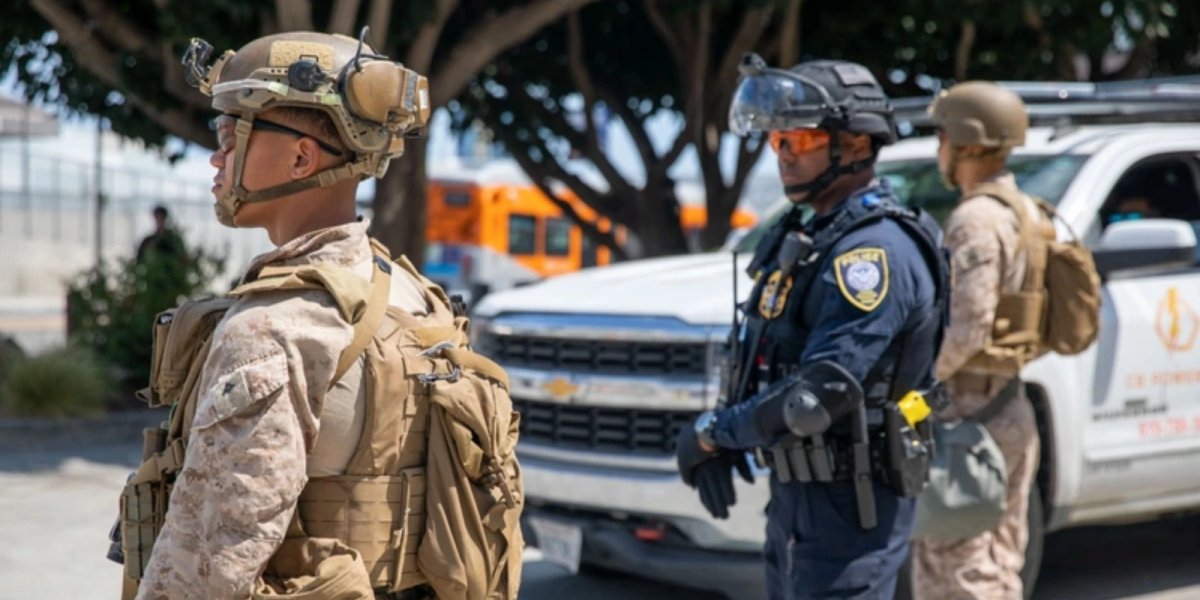President Trump announced on Monday that he will deploy the DC National Guard to Washington, D.C., as part of a sweeping federal intervention to address what he describes as rampant crime and homelessness in the nation's capital.
This marks the first activation of the National Guard in D.C. since the January 6, 2021 Capitol riots, when thousands of troops were deployed to secure the city following the attack on Congress.
The announcement comes alongside Trump's unprecedented decision to federalize the Metropolitan Police Department, placing local law enforcement under Attorney General Pam Bondi's control.
In this article, we'll examine Trump's deployment plan, analyze reactions from local officials and critics, discuss the direct impact on service members, and outline what military personnel can expect in the coming weeks.
The Presidential Authority
Unlike state National Guard units controlled by governors, the Washington DC National Guard falls directly under presidential command through the Secretary of Defense.
This unique structure gives Trump broad authority to deploy these troops without state-level approval, as Section 602 of the District of Columbia Home Rule Act preserves federal government control over federal agencies and military units within the district, despite granting limited self-governance to local D.C. leadership.
The deployment timeline shows federal law enforcement already on the ground, with over 450 officers from various agencies—including FBI, ATF, DEA, and U.S. Marshals—conducting patrols since the weekend. Defense Secretary Pete Hegseth indicated that National Guard Washington DC units will, "flow into the streets" over the coming week, though specific numbers remain undisclosed.
Trump cited two primary justifications for this action: reducing the homeless population and combating violent crime. He described D.C. as being "overtaken by violent gangs and bloodthirsty criminals, roving mobs of wild youth, drugged out maniacs and homeless people." The president demanded homeless residents leave "IMMEDIATELY," promising alternative housing "FAR from the Capital."
Crime Statistics Tell a Different Story
However, the data contradicts Trump's characterization of a crime-plagued city.
According to Metropolitan Police Department statistics, violent crime in Washington, D.C. has dropped 26% in 2025 compared to the same period in 2024.
The U.S. Attorney's Office reports that violent crime hit a 30-year low in 2024, falling 35% from 2023 levels.
D.C. Mayor Muriel Bowser strongly disputed Trump's claims, stating on MSNBC that, "violent crime in D.C. reached historic 30-year lows last year, and is down another 26% so far this year."
Attorney General Brian Schwalb called the federal intervention "unprecedented, unnecessary, and unlawful," signaling potential legal challenges ahead.
The Impact on Service Members
The timing of this deployment coincides with significant leadership changes in the DC National Guard. Major General John C. Andonie retired as Commanding General on August 9, just two days before Trump's announcement. Brigadier General Leland D. Blanchard II now serves as interim commanding general while the Pentagon searches for a permanent replacement.
This leadership transition could complicate deployment coordination and unit readiness. Andonie had focused on strengthening federal partnerships and improving warfighting capabilities during his tenure—groundwork that may prove crucial as the Guard assumes its new domestic mission.
For Guard members, this activation presents both opportunities and challenges. Positively, service members will gain valuable real-world experience in law enforcement support, potentially enhancing their military occupational specialty skills and providing additional training pay. The mission also offers Guard units a chance to demonstrate their dual federal-state capabilities.
However, the presidential memorandum reveals this deployment operates under an open-ended timeline. Trump has directed the Secretary of Defense to mobilize Guard units with "mobilization and duration of duty [to] remain in effect until I determine that conditions of law and order have been restored in the District of Columbia." This means Guard members could face an indefinite deployment with no automatic expiration date.
More significantly for service members nationwide, the memorandum also grants authority to coordinate with state governors to mobilize additional National Guard units from other states "as deemed necessary and appropriate" to augment the D.C. mission. This suggests Guard units across the country could potentially be called to support operations in the capital, creating ripple effects for families and civilian employers nationwide.
Guard members may face family disruption, civilian job conflicts, and the complexities of operating in a politically charged environment. Unlike traditional disaster response missions with clear objectives and timelines, this deployment involves navigating sensitive issues around homelessness and community policing with subjective success criteria.
Active duty implications remain limited for now. For Trump to deploy active duty forces to D.C., he would need to invoke the Insurrection Act or declare martial law—both requiring extraordinary circumstances and Congressional notification.
Current operations rely on National Guard troops who can perform law enforcement support missions that active duty personnel are generally prohibited from conducting under the Posse Comitatus Act.
What to Expect Next
The legal frameworks governing this deployment operate on different timelines. The federalization of D.C. police under Section 740 of the Home Rule Act carries a 30-day authorization that requires Congressional action to extend. However, the National Guard deployment operates under presidential discretion with no statutory end date.
Guard members should stay informed through official channels and prepare for evolving mission parameters. Legal challenges from D.C. officials are expected, potentially creating additional complexity for commanders and troops.
Trump has also hinted at broader federal control over D.C., which would require repealing the Home Rule Act that established local elected leadership and limited self-governance for the district—a move facing steep political opposition.
The DC National Guard now finds itself at the center of an unprecedented indefinite domestic deployment that will test both their operational capabilities and establish new precedents for National Guard utilization in federal-local government relations.
Suggested reads:




